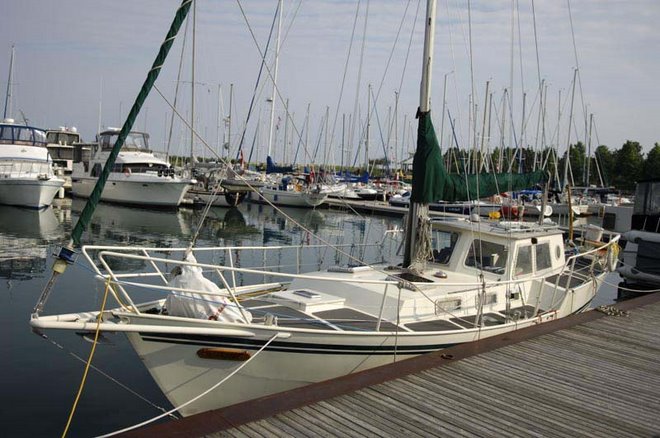 |
| A pleasure cruise in Hamilton Harbour was vetoed by the skipper due to inclement weather conditions. |
The day was near dead calm, with occasional fog and mist, anyway, and I had a reason to want to motor. Alchemy has two keel tanks of about 50 gallons (200 litres) capacity. Both were filled to their respective brims in 2009 before I went into a cradle for a few years to replace the engine, the entire drive train and other needful things. The diesel at that point was primarily intended to keep the tanks of black iron from corroding. I got it from a marina that I knew didn't sell diesel with ethanol in it. I had yet to spec out the new engine, but I had already heard of the ethanol additive effect on deleterious gaskets and seals and its tendency to absorb moisture from the air.
The interesting part came after I had installed the fuel filter system and had stopped (basically) using a siphon from a jerry can, which even in my mind was asking for it. The diesel from the aft tank looked good. It seemed to work. After cleaning the pickup tube (a tiny bit of gunk was found), all seemed to be well. The diesel purred. The boat moved. All was well. I regularly mixed in new diesel and kept that aft tank full.
But I didn't address the forward tank. That was filled with nearly nine-year-old, pure diesel. I topped up that vintage fuel with fresh diesel (if ultra low sulphur, which is another issue). Then I ran the fuel from that tank for an hour at dock (at about 1,300 RPM; I'm not a monster) Again, no issues.
So it was with some trepidation that we departed circa 0800h yesterday. While I knew I had a "good tank", I was keen, frankly, to burn off as much old fuel as I could. As it turned out, the Burlington Bridge, a lift bridge that allows the only access to Hamilton's large harbour (and which we've seen before on our now-sold first boat), only opens on demand and every 30 minutes. My new plotter told me if I could steer tightly, we would get to the piers in front of the lift bridge at 1228h. Yikes. Apply throttle!
So, flat out through flat water it was. I like my hydraulic steering just fine, but under motor and plenty of it, the rudder tends to drift slightly and corrections applied are not subtle. While I don't think this is a problem, particularly, I will be inspecting the fluid levels and the state of the seal. And the purchase of an autopilot, because steering by hand in calm conditions is actually a bit of a drag.
The photo at the top indicates why I didn't take our hosts out for a boat ride. It poured and blowed a fair bit, but the evening and our dinner and convo were great. The next morning, we left the literally brand new and mightily impressive docks of the Royal Hamilton Yacht Club with a lesson learned: the prop walk I use to slip Alchemy's stern to port side with a quickness isn't such a benefit when leaving from a starboard docking. I had to do some awkward spinning between rows of boats to get out. The solution(s) were: to have gone in stern first and docked to port; to have walked the boat back nearly to the bow of the boat in the next row, and then steered to port in forward; or to have done the previous move warping off against a line. Ultimately, no harm, no fouls, no buffer required, but I dislike giving a show before my coffee's settled, and the need to make a bridge opening (it's about a 30 minute motor from the YC to the bridge) by a specific minute (we did) makes for unseemly concern.
 |
| Mrs. Alchemy mulling over autopilot brands. |
 |
| Sea state: Stateless |
 |
| How to Avoid Huge Ships: Lake Ontario Edition. |
 |
| Water scene with duck. |
 |
| My god...the harbour...it's full of duck! |




